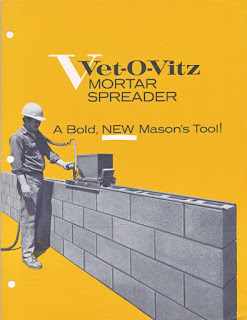James J. Ryan Tool Works, later J.J. Ryan Tool Co. and J.J. Ryan Corp., made a brick chisel, chisels for metal and wood, and screwdrivers.
J.J. Ryan Corp., if it is still active, is the parent company for
Rex Forge, a contract forging works. Ryan has always been located in
Southington, Connecticut, and the
Plantsville neighborhood of the same city. Southington is best known as the home of
Peck, Stow, and Wilcox (Pexto), a major manufacturer of machinery and hand tools. There were number of other steel forging businesses in Southington 100 years ago.
 |
| James J. Ryan Tool Works Catalog No. 23, 1940s |
James J. Ryan was born 3 Oct 1872 in Southington, the son of Irish immigrants. In the 1900 US Census he was single and living with his widowed father Patrick Ryan, an iron molder. James was a bolt header at Clark Brothers Bolt Co., forging a variety of bolt heads on steel rods. At the 1910 US Census, James Ryan had been married 6 years to Mary A. Callahan, and he was a machinist at the same employer.
Between 1914 and 1917, according to Southington city directories, Ryan entered business as a tool manufacturer with David E. Conners at 81 Water St., Southington. By the 1920 directory, he was on his own at the same address, manufacturing primarily screwdrivers, according the 1920 US Census. By 1930 the business was at 315 Center St., Southington. Ryan took over making the famous Perfect Handle screwdrivers when Plantsville's H.D. Smith & Co. went out of business between 1930 and 1933. The name changed by 1951 to James J. Ryan Tool Co.
James Ryan continued to run the business as president, retiring in 1959 at age 87. Anna, the oldest daughter of James and Mary, worked in the business, eventually becoming secretary-treasurer. Harold Francis Donnelly (1915-1996), vice president and plant superintendent in 1951, became president after James Ryan. Donnelly was married to Helen D. Ryan, the youngest daughter of James and Mary. James Ryan died in Southington 26 Jun 1974, age 101.
 |
| Ryan brick chisel |
In March 1964 the business had a fire, followed about 10 years later by another which destroyed the plant. Ryan then moved its operations to Rex Forge in Plantsville, which had space available. After a few years, the companies consolidated. The date Ryan stopped manufacturing tools is unknown.
James J. Ryan Tool Works Catalog No. 23, from the 1940s, is on the Internet Archive, but their brick chisel is not in this catalog.










































